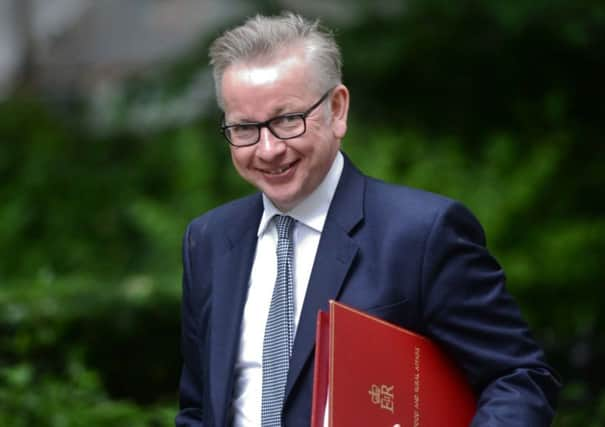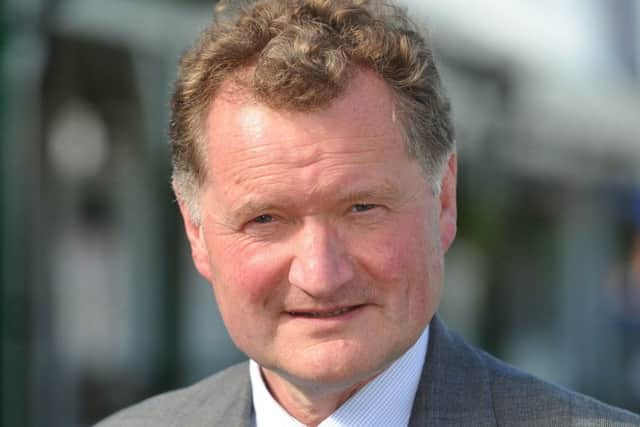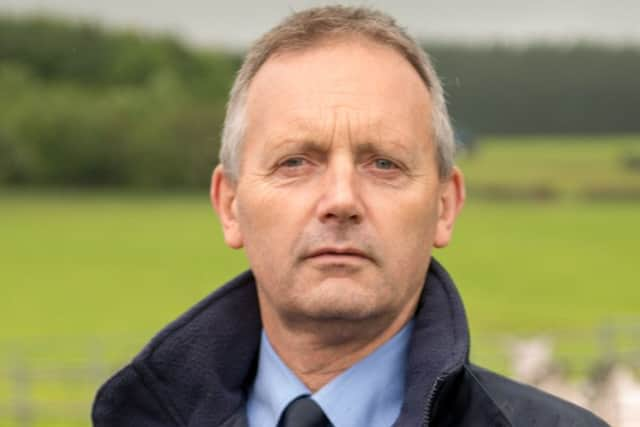Farm assurances sought from Gove in new Defra role


Country Land and Business Association (CLA) president, Ross Murray, offered the most effusive public welcome to Mr Gove in the top Ministerial seat at the Department for the Environment, Food and Rural Affairs (Defra), yet the National Sheep Association (NSA) reported an “alarming” number of concerned calls from its members in response to Mrs May’s Cabinet reshuffle.
The National Farmers’ Union (NFU) published an open letter from its president Meurig Raymond to the MP, which highlighted the kind of support farmers expected from government over the course of a new parliament, which of course encompasses the complex extrication of Britain from membership of the European Union - and British farming’s untangling from the Common Agricultural Policy (CAP).
Advertisement
Hide AdAdvertisement
Hide AdMr Gove has replaced Andrea Leadsom, who spent less than a year in post, having been named Environment Secretary by Prime Minister Theresa May on July 14 last year, shortly after Mrs May’s victory in the Tory leadership vote.


In a tweet following his appointment, Mr Gove said: “It’s an honour to follow a good friend and great Minister in this incredibly important role.”
Reaction from the rural lobby was wide-ranging, with the CLA’s Mr Murray saying: “I am pleased to welcome Michael Gove to the Environment, Food and Rural Affairs brief. He brings significant experience, a reputation for robust challenge of the status quo and a reformer’s zeal. These are all qualities that will serve the land based sector well.”
George Dunn, chief executive of the Tenant Farmers Association, said: “The Prime Minister has placed a political heavyweight and prominent Brexiter in Defra.
Advertisement
Hide AdAdvertisement
Hide Ad“It will be important that he gets up to speed quickly on the challenges faced by the agricultural industry and its determination to play its part in securing a successful future for Britain after we have left the EU.”


Calling for assurances, NSA chief, Phil Stocker, said: “There may well be more to Michael Gove’s empathy with farming than meets the eye, but NSA immediately received an alarming number of concerned contact from members on the day following his appointment. We share this concern and are asking Mr Gove to urgently give the sheep industry some confidence that he understands the value of our sector - I’d like to see an immediate commitment to achieve tariff free trade routes into the EU post Brexit.”
Mr Stocker added: “There are two distinctly differing views within senior members of Government, those who advocate raising production standards and quality and those who see Brexit as a chance to import increasingly cheaper food into the UK. Just over a year ago Michael Gove showed he was clearly in the cheap import camp while being interviewed on BBC Radio 4. Any Secretary of State with a responsibility for Britain’s farming and food agenda cannot move forward with that vision for the future, we need some clear statements of intent urgently.”
The NFU’s Mr Raymond used his letter to Mr Gove to draw attention to the impact Brexit will have on farming.
Advertisement
Hide AdAdvertisement
Hide AdHe wrote: “With farming arguably the sector most impacted by Brexit, NFU members need certainty as soon as possible that this Government will make Brexit a success for British food and farming.


“To achieve our potential, we need a future post-Brexit trade arrangement that delivers the best possible access to the vital EU market, as well as continued access to a competent and reliable workforce. With your experience in reforming policy environments we look forward to working with you to create a new wider policy framework that better delivers for British food and farming - and for our nation.”
Mr Gove was outspoken about what protection would be given to farmers post-Brexit during his own ill-fated attempt to seize Tory leadership after last year’s EU referendum. Then, he said that current payments made to British farmers in support via the CAP would be matched by the government and there would be less “red tape” for farmers to deal with.
Speaking exclusively to The Yorkshire Post last July, Mr Gove said: “There would be no reduction in what people get from the CAP but what we do want to look at is the bureaucracy which leads to delays in payments. So we would want to keep the money and not the bureaucracy.”
VOTING RECORD


Advertisement
Hide AdAdvertisement
Hide Ad“One look at Gove’s voting record shows him unfit for this job”, tweeted co-leader of the Green Party, Caroline Lucas - so what does his record show?
Has generally voted against measures to prevent climate change;
Consistently voted for selling England’s state owned forests;
Generally voted for culling badgers to tackle bovine tuberculosis;
Voted a mixture of for (twice) and against (twice) greater regulation of fracking;
Generally voted for reducing the rate of corporation tax;
Generally voted for increasing the rate of VAT.